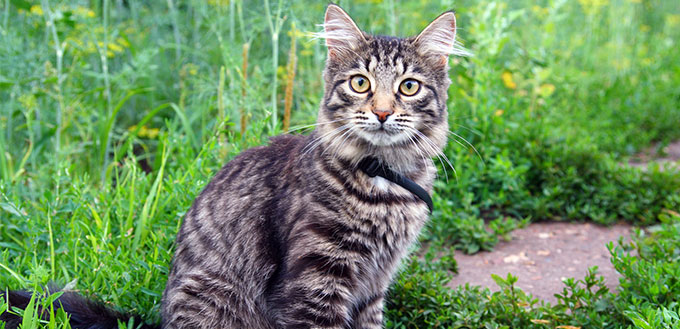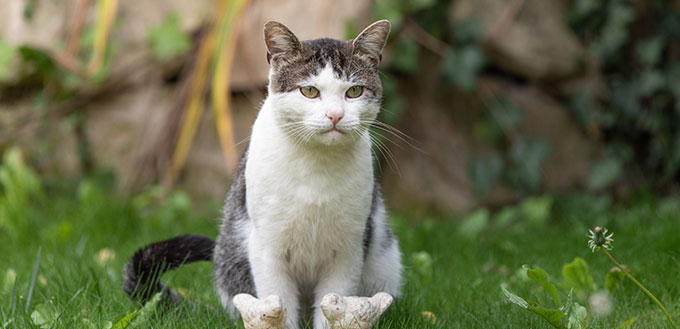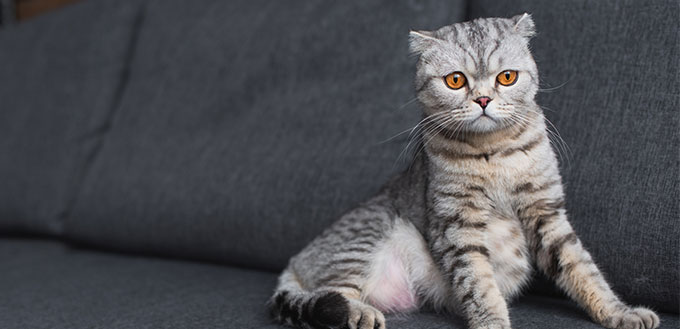Have you ever noticed an unexplained increase in how often your cat drinks water? Or perhaps you may have observed that your feline buddy has developed a sudden increase in appetite. Or maybe you may have noticed that your usually very well-kept cat is beginning to develop a poorly kept haircoat with increased irritability and restlessness. If everything mentioned so far ticks your boxes, then your feline friend could possibly be suffering from feline hyperthyroidism. It is important to note, however, that the information given in this article is not intended to replace your visit to the vet. If you think that your cat may be suffering from hyperthyroidism, please visit your vet immediately for the right diagnosis to be done. In this article, we will take a closer look at hyperthyroidism in cats or overactive thyroid, its symptoms, and the kinds of treatment available.
What Is Overactive Thyroid In Cats?
Overactive thyroid in cats, otherwise known as feline hyperthyroidism, is a common disorder that affects cats when they reach adulthood? Thyroid problems in cats, as mentioned previously, is not an uncommon thing, especially in adult cats. This does not mean that it should not be taken seriously. Overactive thyroid in cats occurs when the thyroid glands that are located in the neck increase the production of thyroid hormones. This is usually the case when the thyroid gland becomes enlarged as a result of a tumor known as an adenoma. Adenoma, however, is not a cancerous tumor. In some rare cases, hyperthyroidism can also be caused by adenocarcinomas. These are malignant tumors. However, when it comes to overactive thyroids in cats, the causes are not known. That notwithstanding, there are certain factors that may contribute to this condition. These factors include excesses or deficiencies in certain important compounds in a cat’s diet and too much exposure to chemicals in a cat’s food that disrupt the thyroids. Because the thyroid hormones have an effect on almost all the organs in a cat’s body, thyroid problems in cats usually fall in the category of the secondary problem. Also, because the thyroid hormones also affect and regulate a cat’s metabolic rate, cats that have the condition tend to use up too much energy too soon. This usually leads to a loss in weight despite the fact that the cat might have an increase in appetite and food intake. In the majority of reported cases, feline hyperthyroidism has been caused by one disease or another that has led to an enlargement of the thyroid glands. But the good news is that most of the cats that develop overactive thyroids or hyperthyroidism can be treated. The success rate of hyperthyroidism in cats treatment is very high. As a result, most of the treated cats go on to make a full or complete recovery. As mentioned earlier, when you notice the symptoms or suspect that your cat is suffering from hyperthyroidism, it is best to take it to the vet as soon as possible.
Now, let’s take a look at the manifestations or symptoms of overactive thyroid in cats.
Symptoms Of Hyperthyroidism In Cats
As mentioned earlier, feline hyperthyroidism often occurs in older cats and middle ages cats. The condition is very rare in cats that are seven years of age and less. Also, the condition affects both male and female cats equally. During the first stages of the condition, several signs or symptoms become visible. But these symptoms only appear subtly. They only become worse when the disease becomes more severe with time. It is important to note that, because this condition is mostly found in adult cats, it can lead to other complications that could mask or hide the symptoms of hyperthyroidism.
Let’s take a look at the usual symptoms of this condition.
- Loss of weight: You will notice a sudden unexplained loss of weight in your cat, although it will be accompanied by an increase in appetite.
- Increased thirst: Your feline friend will consume more water than usual.
- Restlessness or increased activeness: Your usually gentle cat will have difficulty staying still for even a short period of time. You may also notice a constant struggle to find a comfortable sleeping position.
- Tachycardia: This is simply an unexplained increase in your cat’s heartbeat or heart rate.
- An unkempt hair coat or a poor-looking haircoat: Your cat’s hair coat will look unkempt and poorly-groomed.
- Diarrhea: In some cases, your cat will experience diarrhea. It could be mild or moderate, depending on the severity of the condition.
- Vomiting: In some cases, despite the increase in appetite, your cat will struggle to keep anything down.
- Heat intolerance: in some cases, when the condition reaches an advanced stage, your cat will be very intolerant of heat. You may notice regular attempts to find a comfortable place to cool off. Also, in some advanced stages, your cat will begin to pant excessively when it is stressed out. This behavior is very rare in cats.
- Weakness: Despite an increase in appetite, you may notice a general lack of energy in your cat. It will exhibit a lot of weakness and lethargy.
- Complications: If the condition is not diagnosed and treated promptly, it could lead to certain complications. For example, it could lead to a change in the muscular walls of the heart. This will lead to a rapid increase in heart rate, and, if not treated, a heart failure.
Another complication of this condition is high blood pressure or hypertension. This can cause problems to your cat’s eyesight, brain, heart, and kidney.
A complication of hyperthyroidism can also give way to chronic kidney-related diseases.
How To Treat Hyperthyroidism In Cats
As mentioned earlier, hyperthyroidism usually happens when the thyroid glands located in the neck become enlarged. However, this is not visible from the outside. Thus, the best thing to do when you suspect a case of overactive thyroids is to take your cat to the vet as soon as possible. Your vet will conduct some physical examination followed by a blood examination. If the condition is diagnosed, treatment will follow immediately. It is important to note that under no circumstance should you attempt to treat your cat at home. His condition requires professional medical treatment by a qualified vet. Most cats gain full recovery when treatment is completed.
There are two main forms of treatment – ani-thyroid drug treatment and surgical thyroidectomy.
Anti-thyroid drug management requires the use of thioamides. This mainly involves drugs such as methimazole and carbimazole. These drugs come in the form of tablets. When administered, they help to reduce the production of the thyroid hormones as well as their release. Just as the name suggests, anti-thyroid drug management does not offer a complete cure for the problem. It only helps to manage it on a short-term or even long-term basis. These drugs are usually administered on a daily basis (mostly two times a day). As the symptoms improve, the dosage is reduced. Side effects of using anti-thyroid management drugs include lethargy, poor appetite, and vomiting.
Surgical thyroidectomy involves the removal of the tissues that have been affected by surgical means. Unlike the management tablets, when surgical thyroidectomy is successful, it means a complete cure of the condition. However, there are chances that previously unaffected tissues can become infected after surgery. This may lead to occasional symptoms of hyperthyroidism resurfacing. Another risk that may come with surgical thyroidectomy is the possible damage to the parathyroid glands as they are located within the thyroid glands or lie close to them.
Other treatment methods include dietary treatment and therapy using radioactive iodine. The latter is administered in a single dose of injection. Radioactive iodine therapy has a very high success rate and comes without the risks involved in the surgery, as the radiation normally destroys the affected tissues without affecting the parathyroids.
Dietary treatment is a relatively new and effective way of managing the condition. It involves feeding the cat with a specially formulated diet that has specially controlled iodine levels. The thyroid glands use iodine to produce the hormones. Thus, if there is only enough iodine available, the hormones will not be overproduced.
How To Prevent Feline Hyperthyroidism
There is no straightforward way of preventing feline hyperthyroidism. However, there are certain things you can do as a cat owner.
- Ensure that your cat’s diet does not contain too much iodine. Also, ensure that your cat does not consume too much soy protein.
- Opt for pouches in the place of cans when feeding your cat moist food.
- Avoid giving your cat demineralized or bottled water.
- Use cat litter without deodorants. Also, opt for biodegradable cat litter.
- Consider giving your cat a bath every month.
- Avoid using topical flea treatments often.
To Summarize
In summary, hyperthyroidism in cats is not uncommon in adult cats. Once you notice any of the above symptoms mentioned, take your cat to a vet as soon as possible for a proper diagnosis to be conducted. If your cat is confirmed to have the condition, the best form of treatment available will be administered. Feline hyperthyroidism can be treated – and successfully so. When the condition is left untreated, it can lead to certain complications that include a failure of the heart.
Sources:
- Mark E.Peterson DVM, Etiopathologic Findings of Hyperthyroidism in Cats, ScienceDirect
- Mark Peterson, Hyperthyroidism In Cats: What’s Causing This Epidemic Of Thyroid Disease And Can We Prevent It?, SAGE Journals
- Anne Rossing, DVM, Evaluation Of Dietary And Environmental Risk Factors For Hyperthyroidism In Cats, American Veterinary Medical Association
Note: The advice provided in this post is intended for informational purposes and does not constitute medical advice regarding pets. For an accurate diagnosis of your pet's condition, please make an appointment with your vet.









